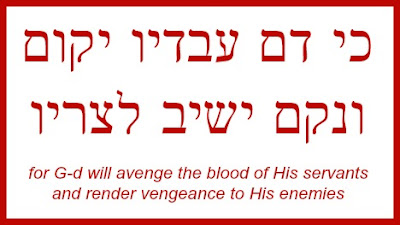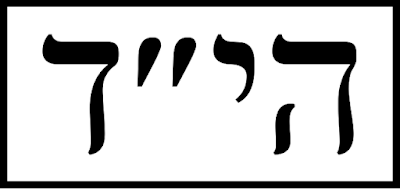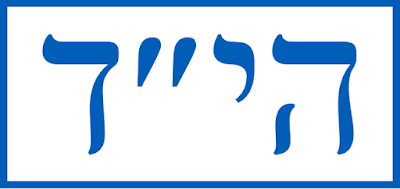Simchat Torah Massacre: These have been terrible days in the history of Jews, in the history of Israel, and in the history of the world.
Many different people - Jews, non-Jews, Americans, Citizens of the World - have reacted to the Simchat Torah Pogrom, the Shemini Atzeret Massacre, the High Holiday Horror, in many different ways.
Opposition Leader MK Yair Lapid said on CNN:
This is the worst day in our history since the Holocaust.
Since the Holocaust, there was never such a number
of Jews killed in one day.
In the days following the October 2018 Tree of Life Massacre in Pittsburgh, Abq Jew took little consolation in the Stronger Than Hate theme - and the prayers for peace - that emerged.
Instead, Abq Jew focused (see Avenge. Redress. Vote Democratic.) on the end of the Av HaRachamim prayer, which includes the words
Like you, Abq Jew has been following everything going on - at The Jerusalem Post (which has been subjected to numerous cyberattacks), at The Times of Israel, on Facebook, and on X (formerly Twitter), which has minute-to-minute updates from usually-reliable sources.
Like you, Abq Jew has seen the horrifying images and heard the terrifying stories. And, like you, Abq Jew has seen the death notices - dear God, so many death notices! - and the searches for people missing and not heard from.
Many of the death notices do not end with the usual acronym ז״ל, zichrono/a l'bracha, of blessed memory, z"l. Instead the appellation used is often
הי״ד, Hashem yakum damo/a/am, may God avenge his/her/their blood, HY"D. Which is used after the name of someone killed because he was Jewish, as a prayer to God that He avenge his death.
After the Tree of Life Massacre, Rabbi Meir Soloveitchik wrote this response in Commentary. It begins with a familiar quotation from Deuteronomy. The one about Amalek.
Remember what Amalek did to you on your journey, after you left Egypt — how, undeterred by fear of God, he surprised you on the march, when you were famished and weary, and cut down all the stragglers in your rear.
And Rabbi Soloveitchik continues. Instead of "Pittsburgh" - read "southern Israel."
As the names of the Jews murdered in Pittsburgh were released, many of their co-religionists, responding online to this unthinkable occurrence, looked to Jewish tradition and parlance. “Zichronam Livracha,” some of them typed. “May their memories be a blessing.”
That is indeed the phrase usually utilized to mark the passing of a Jew, and it was heartfelt. But it was also, in this context, insufficient and therefore inappropriate.
When Jews are murdered because they are Jews—by a Nazi in Auschwitz, by a terrorist in Netanya, or by an anti-Semite in Pittsburgh—then the traditional phrase we use is different, and starker.Hashem Yikom Damam, we say.May God avenge their blood. The phrase draws on several biblical verses, paralleling the 13th-century prayer known as Av HaRachamim, which, commemorating those murdered in the Crusades, cites the Psalms:
Why should the nations say, “Where is their God?”Let it be known among the nations in our sightthat You avenge the spilled blood of Your servants.And it says: “For He who exacts retributionfor spilled blood remembers them.He does not forget the cry of the humble.”
Prayers such as these illustrate something fundamental about Judaism. Memory is central to Jewish life; that is why we pray after any death that the one who has passed should be remembered.
Yet when it comes to murdered Jews, our recollection of how they died must be joined forever with a prayer for divine vengeance.Why is this so?The saying reflects the fact that when it comes to mass murderers, Jews do not believe that we must love the sinner while hating the sin; in the face of egregious evil, we will not say the words ascribed to Jesus on the cross: “Father, forgive them, for they know not what they do.”
We believe that a man who shoots up a synagogue knows well what he does; that a murderer who sheds the blood of helpless elderly men and women knows exactly what he does; that one who brings death to those engaged in celebrating new life knows precisely what he does.
To forgive in this context is to absolve; and it is, for Jews, morally unthinkable.
The Tree of Life Massacre taught us many things that we did not wish to know. Among them - how the martyred are to be buried. In November 2018, Shira Telushkin wrote in Tablet Magazine:
Throughout Jewish history, the blood of the Jewish martyr has served as an active witness against the horror of the crime they endured. In accordance with historical law, when someone is murdered for being Jewish—for dying al kiddush hashem, for the sanctification of God’s name—there is the tradition to bury the individual in the clothing in which they were murdered.
The individual is not washed or dressed in the typical shrouds, or tachrichim, of the Jewish dead; their own blood is understood to recommend them far more than any purification ritual ever could.
They need no further purification; they have been made holy in their death, and their clothing itself engenders God’s mercy, and demand God’s justice on earth. The blood is supposed to outrage those who witness it, and stir the Jewish people from any complacency to such an act.
Rabbi Soloveitchik continues:
But the mantra for murdered Jews that is Hashem Yikom Damam bears a deeper message.
It is a reminder to us to see the slaughter of 11 Jews in Pennsylvania not only as one terrible, tragic moment in time, but as part of the story of our people, who from the very beginning have had enemies that sought our destruction.
There exists an eerie parallel between Amalek, the tribe of desert marauders that assaulted Israel immediately after the Exodus, and the Pittsburgh murderer.
The Amalekites are singled out by the Bible from among the enemies of ancient Israel because in their hatred for the Chosen people, they attacked the weak, the stragglers, the helpless, those who posed no threat to them in any way.
Similarly, many among the dead in Pittsburgh were elderly or disabled; the murderer smote “all that were enfeebled,” and he “feared not God.”
Amalek, for Jewish tradition, embodies evil incarnate in the world; we are commanded to remember Amalek, and the Almighty’s enmity for it, because, as Rabbi Joseph Soloveitchik explained, the biblical appellation refers not only to one tribe but also to our enemies throughout the ages who will follow the original Amalek’s example.
To say Hashem Yikom Damam is to remind all who hear us that there is a war against Amalek from generation to generation — and we believe that, in this war, God is not neutral.








2 comments:
Appreciate this and near-completely out of words, so there's that.
May God avenge their blood but vote for the Jew hating monsters who killed them. Absolute disgrace.
Post a Comment